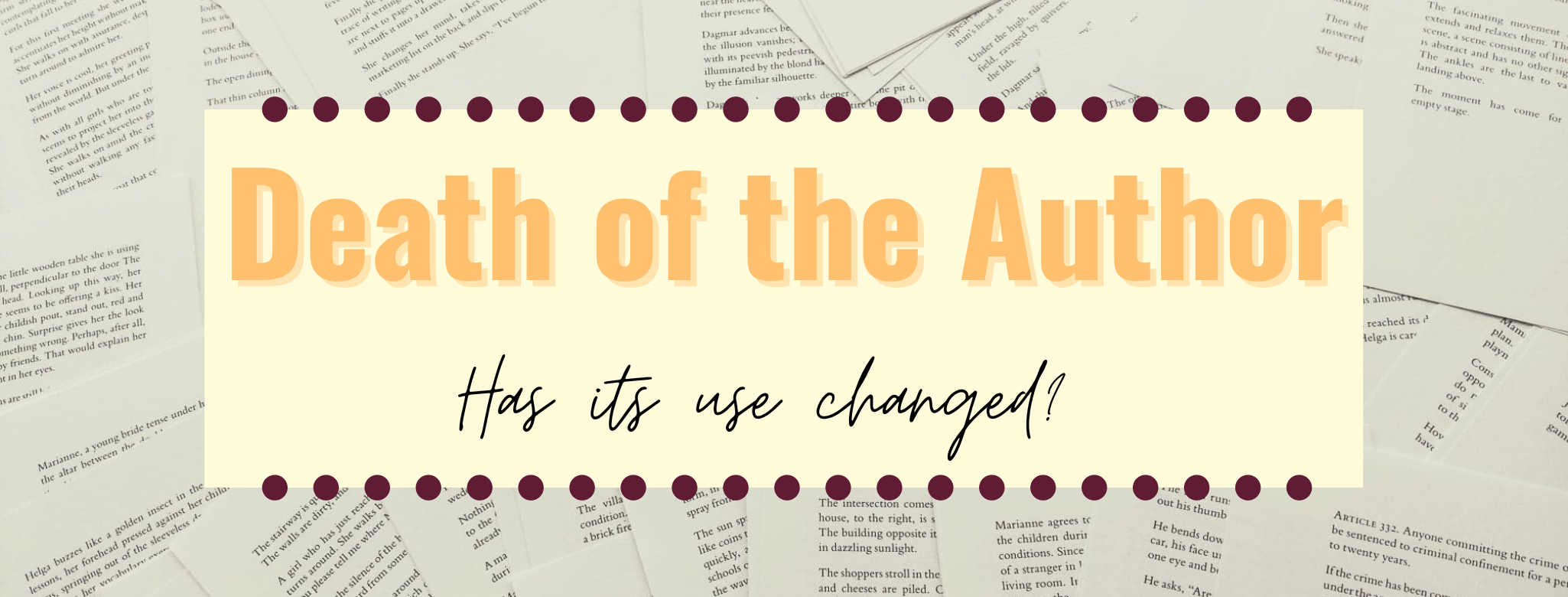How is everyone? It’s been a while but, as discussed in my last post, I’m continuing to make some PhD progress. I’m at the stage where I’m not really adding anything new to the overall idea(s) covered, just developing them through the rewriting and editing process. But going through it all is setting my mind on fire with thoughts which show how my perspective has changed through this process. Some of these thoughts will be pulled into the dissertation itself, but others might have to be saved until later. Today, I’m going to ramble a bit about one such thought: the death of the author and whether it is relevant today.
Death of The Author: A Brief Summary
Roland Barthes’s Death of the Author is probably one of the biggest texts in literary theory. Published in 1967, I guess you could describe it as a kind of hinge point where theories which put the focus of interpretation on the text transitioned into greater attention on reader response and biographical theories were ousted. To give a very rough timeline, the early years of literary studies cared a lot about biographical and historical context in understanding a text. The author had to have meant something when they made the curtains blue, right? Later schools of thought, such as New Criticism and Structuralism, went in a different direction, looking at the text itself as the only source of meaning. Barthes arguably went a step further than this, arguing that the tyrannical author-god needed to die in order for the reader to be free. What the author said didn’t matter, but rather what the reader read. The author needs to METAPHORICALLY die so that they can’t impose their will on the reader.
Naturally, as one of the biggest theories in literature, there has been a lot of criticism against it. Barthes’s author-god so obviously represents only one authorial identity type, ignoring the fact that some voices — such as women and queer authors — have historically been supressed. Should the context of their experience be ignored? It is also notable that Barthes was writing as the celebrity author rose to prominence. Authors were appearing more and more within the media. With social media, they are even more visible. Is the metaphorical death of the author possible when they won’t stop tweeting?
Does Death of the Author matter?
I encountered a problem while writing my literature review. You see, I knew I had to talk about Death of the Author due to its importance as a theory related to authorship, but I struggled to create more of a ‘why’ than ‘because it’s a big theory’. But, when I thought about it, the theory arguably didn’t matter outside of academic spheres. It’s all about interpretation and meaning from a critical perspective; it didn’t change how we view what an author is. So, why did it matter?
My first encounter with Death of the Author took place in my first year. We had an excellent class that went over various theories related to literature and writing. This eventually brought us to Barthes. Coincidentally, this was also close to the time that a particular author — let’s call her KJR — posted a tweet suggesting that a canonical couple should never have ended up together. I, a fan of the series at that time, was incensed. Cue a very passionate class discussion about whether she should be able to retrospectively change textual details through social media. Obviously, I argued for the death of the author (METAPHORICALLY!). Why should the author’s opinions change my enjoyment of the text?
Death of the Author: New Uses
Notably, my reaction to the author and rationale for supporting Barthes’s argument… didn’t actually match what Barthes was saying. His focus was on literary criticism and the interpretation of a text. Mine had drifted more into what I accepted as canon and what I rejected. Since that class though, Death of the Author discussions have arisen more and more around KJR, and they similarly drift from what Barthes actually said in his seminal essay. Instead, these discussions focus more on the question of whether fans can ignore the problematic author to continue consuming the text. If the author, through their online behaviour, has revealed themselves to be a horrendous bigot, is it still okay to keep buying the books/collecting merch/visiting the themes parks when we know she’ll profit from these actions?
Obviously, that question alone is a hard question to answer. I have my personal views on the topic. But, from an academic perspective, the way Death of the Author has been adopted to rationalise reader behaviour is really interesting to me. It’s not what I think Barthes meant in writing his essay — there’s no birth of the reader happening here — and instead I actually see more echoes of Foucault’s What is an Author?. Written vaguely in response to Barthes, Foucault suggests that the author is a function of the text but, more importantly in this discussion, that ultimately the author name is a means of holding the author accountable. Foucault, perhaps for reasons relating to his own personal behaviour, thought that we should ultimately reach the stage where this expectation of accountability shouldn’t matter and then the author name won’t matter. Current uses of DotA seem to mirror this point. If the author is metaphorically dead, we can still consume their content, right? But this fails to hold them accountable for their actions.
Why this matters?
Well, for my dissertation, realising the way Death of the Author is used currently helped me have a click moment in writing my literature review. It matters because it’s being pulled into contemporary discussions related to social media, such as authorial authority and visibility. Sure, it seems to have become somewhat distorted along the way, but that just makes it more interesting. DotA in scholarly spaces is about interpretation, but its use in popular culture speaks to a possible desire for greater separation between author and text. Or maybe the questions of authorship and the ways they use their platforms. Or even, rather than reader response, reader responsibility in consumption.
Once PhD is done I’ll dive into this more. Maybe some sort of case study on that author? But it seems like an interesting point worthy of more discussion. I’d love to hear any thoughts below though! Does the new use for Death of the Author suggest a lack of accountability? Or is it just another way to free the reader from the tyrannical author-god in the face of their presence on social media?



